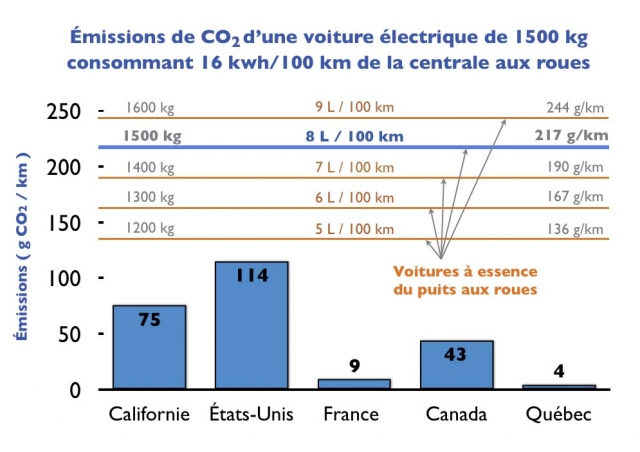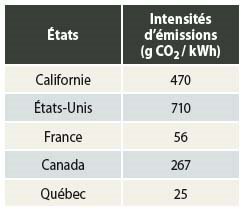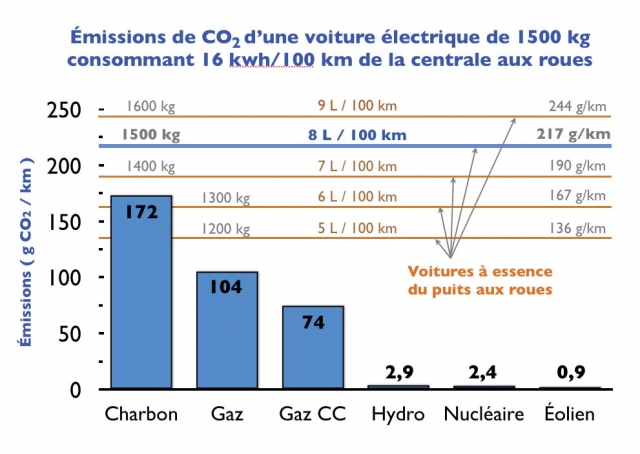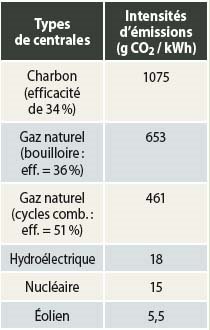It can never be said enough: an electric vehicle can be competitive on the CO2 if and only if the primary energy source that produced the electricity required for its charge emits low CO2 emissions! But fortunately: there is not only the CO2 in life ...
CO2 emissions from electric cars
Often, when we talk about electrically powered vehicles, we are wondering whether transferring emissions from traditional cars to power plant emissions will really improve things about greenhouse gases.
To answer this question, we must first consider the CO2 emissions of the various networks, expressed in grams of CO2 per kilowatt-hour of electricity produced. These values can be obtained via the statistics of the energy or environment ministries or departments of the different countries or states, or via the state electricity companies (EDF in France and Hydro-Québec in Quebec).
However, greenhouse gas emissions from these organizations or corporations are often those that result from the burning of fossil fuels in the power plants themselves. Emissions from oil or gas mining activities are lacking, to go underground for various fuels, including uranium for nuclear power plants. These data also do not take into account the processing of raw materials and their transport, or the construction of plants. There is also a lack of emissions resulting from the decomposition of submerged trees in reservoirs of hydroelectric dams. To account for these various aspects, a life cycle study of one kiloWatt-hour of electricity, from ground to outlet, is required. Various studies tell us, roughly, that 15% emissions must be added for petroleum and coal and 25% for natural gas. For nuclear power plants, there is usually 15 gCO2 / kWh, and 18 gCO2 / kWh should be added for hydroelectric dams. In doing so, for California, the United States, France, Canada and Quebec, the emission intensities are obtained from the following table.
Now, an electrically powered intermediate car, built in 2009 with the best commercially available technologies, consumes about 17 kwh / 100 km of electricity stored in its battery. On the other hand, with wheel motors, a lighter car and better aerodynamics, consumption should be reduced to 12 kwh / 100 km of electricity stored in the battery, say to 2020. But, to evaluate the emissions of CO2, we will assume a consumption of 15 kwh / 100 km from the electricity stored in the battery. We add 6% for the losses of the socket (alternative) to the electricity stored in the battery (continuous), which brings the actual consumption to 16 kwh / 100 km, from the power station to the wheels. To obtain the CO2 emissions of the electric car, it is sufficient to multiply this actual consumption by the emissions of the networks of the preceding table.
The results are shown on the graph at the beginning of this post. It also includes CO2 emissions from gasoline cars for comparison purposes. The 1500 kg intermediate car (thick blue line) is equivalent to the electric intermediate car for which we made the emissions calculations.
To obtain CO2 emissions from conventional cars, we assume that gasoline is fully burned, which releases 2,36 kg of CO2 per liter. The CO2 released from the oil well is taken into account in the tank of the car, adding 15%, which corresponds to the evaluations of the various studies on the subject.
It is particularly interesting that in the United States, with a fleet of plants burning fossil fuels to produce 70% of electricity (50% of coal plants and 20% of natural gas plants), CO2's of an electric car are still better than those of a car consuming 5 liters / 100 km, like a Prius. In France and Quebec, electric cars would emit much less gas than a Prius, as we can see.
Quebec appears, in fact, as a place quadruplement privileged to implement the electric mobility in America, due to
- the significant reduction in greenhouse gases that will result,
- the abundance of electricity found there and its renewable aspect,
- at its low cost (0,07 $ / kWh),
- and the very important economy on oil imports (100% of imports)
To better see the difference between the various types of power plants, the following graph shows the CO2 emissions of an intermediate electric car that we would recharge the battery with electricity from different types of plants.
The calculation method is identical to the previous graph, except for the intensity of emissions that are no longer those of the networks as a whole, at different locations, but rather the intensity of GHG emissions of the various types of emissions. central, from the ground to the socket. The following table summarizes the results obtained using the GHGenius life cycle calculator developed for Natural Resources Canada ( http://www.ghgenius.ca )
Therefore, as can be seen, CO2 emissions from electric vehicles or plug-in hybrids in electric mode are still considerably lower than those of traditional vehicles using petroleum fuels. The last chart also shows the importance of using renewable energy to drastically reduce our emissions.
Source: P. Langlois's blog
We must qualify this reasoning because I find it a little too full of excess optimism especially on the figures of 16 kWh / 100 km from the power station to the wheel (see below) and the figures of emissions of kWh in France (I had 90 g / kWh in mind).
Moreover if we must take into account the construction of plants: what about the life of the batteries still limited? In 2020 it may be different? I hope so! A director of Mitsubishi confessed that only the farbication of the batteries already issued 40g CO2 / km, see here: https://www.econologie.com/forums/mitsubishi ... t6280.html
Equivalence between 16 kWh / 100 km and fuel consumption at equal "vehicle" efficiency
16 kWh from the power station to the wheel ca gives, according to the author, 15 kWh from the battery to the wheel (6% is already very low like various central losses -> battery but whatever).
These 15 kWh will give (90% yield) 13.5 useful mechanical kWh.
This value corresponds to the consumption with a good modern diesel engine (35% average efficiency) at 13.5 / (0.35 * 10) = 3.86 L / 100 km. It's little but realistic with a small vehicle. We thus obtain emissions of 3.86 * 2.6 = 100 gr CO2 / km and we thus pass below the bar of 114 gr / km ...
In short it is not easy to decide on the CO2 with electric propulsion but it is easier to produce electricity in the garden than to drill a well of oil ... If you know what I mean! And in a general way I think it's a mistake to limit ourselves to CO2 emissions when we talk about electric transport: are there no other pollutants whose suppression is a considerable advantage for public health?









